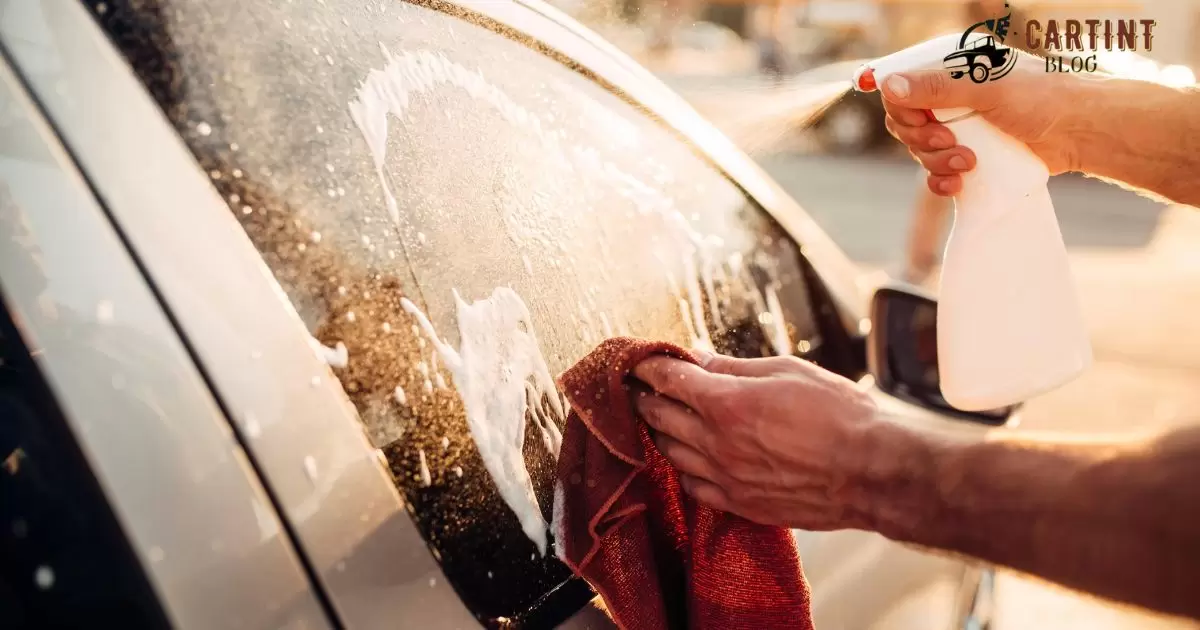Tinted windows have become increasingly popular for both homes and vehicles over the last few decades. The dark tinting not only looks sleek and modern, but also provides privacy, glare reduction, and protection from UV rays. However, cleaning tinted windows requires special care as harsh chemicals can damage the tint film. This leads many people to wonder – is vinegar safe for cleaning tinted windows?
Curious about Is Vinegar Safe For Tinted Windows? Vinegar has gained popularity as an all-purpose green cleaner due to its affordability, availability, and antimicrobial properties. Made from fermented grains, fruit juices, or ethanol, vinegar contains acetic acid which gives it the ability to cut through grease and dissolve mineral deposits.
The safety of using vinegar to clean tinted windows depends on a few key factors. These include the vinegar type, concentration level, other ingredients mixed with it, and the application method. While vinegar alone may pose little risk of harming tint film, issues can arise if it is used incorrectly or combined with incompatible cleaners.
Vinegar Safe for Tinted Windows
Tinted windows are growing in popularity for homes, offices, and vehicles due to the many benefits they provide. The tinting film applied to windows blocks UV radiation, provides privacy, reduces glare, and can even help lower indoor temperatures. But cleaning these specially treated windows requires some special care as well.
Vinegar has emerged as a go-to cleaning solution for many household surfaces due to its affordability, availability, and cleaning power. But is vinegar actually safe to use on tinted windows? This complete guide examines the benefits and risks of using vinegar solutions on tinted glass. Can you see through a tinted window of a car? It’s a common concern for car owners, and understanding the impact of cleaning solutions .
What are the Benefits of Cleaning Tinted Windows with Vinegar?
Vinegar offers some potential advantages as a tinted window cleaner:
Natural and Affordable
- Made from fermented grains or byproducts from food production, white vinegar is inexpensive, natural, and commonly available.
- Significantly cheaper than most commercial glass cleaners. Just a few dollars provides enough to clean all windows in a home.
Cleans Effectively
- High acidity allows vinegar to break down dirt, grease, hard water stains, and other grime that accumulates on windows.
- Acidity also provides disinfecting properties to kill germs without harsh chemical fumes.
Typically Ammonia-Free
- Many glass cleaners contain ammonia, which can damage window tint adhesives over time. Vinegar has no ammonia.
Leaves No Residue
- Vinegar solutions dry cleanly without leaving cloudy films or streaks like some window cleaners.
So vinegar does offer some useful traits as an economical, effective, and chemical-free cleaning solution for tinted windows.
Ammonia-Free Glass Cleaner For Tinted Windows
Ammonia damages window tinting. It breaks down the adhesives holding the film on glass. This causes bubbling, peeling, and purple discoloration over time. Using cleaners with ammonia frequently degrades tinted windows.
Specialized products clean tinted windows safely. They contain surfactants and alcohol to cut grease and dirt. Soft microfiber cloths also prevent scratching during wiping. These ammonia-free glass cleaners maintain tint by lifting residue without harming dyes or adhesives. Tinted window cleaners protect films when used properly.
What Risks Exist in Using Vinegar on Tinted Windows?
However, vinegar’s high acidity also introduces some potential downsides:
Could Damage Window Film
- The acetic acid that gives vinegar its cleaning power could also damage the dyes or films applied to tinted windows.
- Repeated use may cause bubbling, peeling, discoloration or other signs of breakdown over time.
May Harm Adhesives
- The adhesives bonding tint film to glass could weaken with continuous exposure to vinegar’s acidity.
- This could allow moisture or air underneath to loosen the film.
Potential to Scratch
- Vinegar may erode any anti-scratch coatings on tinted windows.
- Using abrasive applicators like scouring pads risks scratching the film.
So while vinegar can effectively clean tinted windows, its acidic qualities do introduce risks with long-term use. Preventing damage requires proper dilution, application methods, and frequency of use.
Factors That Impact Vinegar’s Safety for Tinted Windows
Several key factors determine whether vinegar can be safely used to clean tinted windows:
Type of Tint Film
- Many different dyes and films are used to tint windows, with varying levels of chemical resistance.
- More advanced films are typically more resilient to damage from cleaners.
Window Construction
- How the tint film is applied and sealed impacts vulnerability.
- Factory-installed tints may have more protective barriers than aftermarket films.
Dilution Ratio
- Full-strength vinegar may be too harsh, while a gentler dilution with water can still effectively clean.
- Starting with a 50/50 mix provides cleaning action while limiting acid exposure.
Application Method
- Manual scrubbing with abrasive pads or brushes risks scratching.
- Using soft microfiber cloths and efficient spraying techniques is ideal.
Frequency of Use
- Rare cleaning with vinegar likely poses little risk for most tint films.
- But repeated cleaning over time increases chances of adhesive or film degradation.
Homemade Window Cleaner For Tinted Windows
@ceithgriffith Homemade window cleaner!
Specialized cleaners keep tinted windows looking pristine. Homemade solutions like vinegar, rubbing alcohol, and dish soap also clean effectively. They remove dirt, dust, grease, and grime without damaging dyes or adhesives. Proper dilution and gentle wiping prevent scratching the film. Homemade cleaners complement occasional professional services.
| Ingredient | Mixing Ratio | Benefits | Precautions |
| Distilled White Vinegar | 1 part vinegar to 1 part water | Cleans glass, removes hard water stains, disinfects | Use diluted, rinse residue |
| Isopropyl Rubbing Alcohol | 1 part alcohol to 1 part water | Disinfects, dries quickly without streaks | Avoid contact with window framing/trim |
| Dish Soap | 1 tsp per 2 cups water | Cuts through oily grime | Use mild formulation, rinse thoroughly |
Guide to Safely Using Vinegar on Tinted Windows
Vinegar can be used safely on tinted windows by following these best practices:
Step 1: Inspect Windows & Gather Supplies
- Examine windows for existing signs of damage or weaknesses in the film before cleaning.
- Ensure vinegar, water, spray bottle, microfiber cloths, and soft sponge/squeegee are available.
Step 2: Mix Vinegar Dilution
- Start with a 50/50 mix of distilled white vinegar & water.
- Adjust ratio as needed based on cleaning needs and window resilience.
Step 3: Spray and Wipe
- Lightly spray vinegar solution onto window and spread evenly with a damp microfiber cloth.
- Wipe clean using gentle pressure and smooth, circular motions.
Step 4: Rinse & Dry
- Wipe again using just clean water to rinse vinegar residue off windows.
- Dry thoroughly with a designated window chamois or microfiber cloth.
Step 5: Limit Frequency
- Clean tinted windows with vinegar no more than once every 2-3 months.
- For heavy cleaning needs, use specialized tinted window cleaners.
Professional Tinted Window Cleaning Alternatives
Using professional window cleaning services offers a worry-free way to keep tinted windows spotless:
Specialty Cleaners
Professional tinted window cleaners are:
- Formulated not to contain ammonia, citric acid, or other damaging ingredients
- pH balanced specifically for tinted films
- Designed to produce streak-free results
Soft Cleaning Tools
Window cleaning pros use:
- Microfiber cloths, chamois, and squeegees to prevent scratching
- Extendable poles for safely cleaning hard-to-reach areas
Experienced Technique
Companies that specialize in tinted window care:
- Train staff on the safest and most effective methods
- Take precautions not to use too much pressure or friction
- Ensure adhesive layers or seals aren’t compromised
So while vinegar can work for periodic tinted window cleaning, hiring professionals using the right products and methods is the best way to keep films looking pristine long-term without risk of damage.
Best Cleaner For Tinted Windows
Specialized cleaners keep tinted windows looking pristine. They contain surfactants to cut through dirt and oils. Soft microfiber cloths lift residue without scratching during wiping. Ammonia-free products also protect delicate dyes and adhesives. Using these cleaners properly maintains clarity and prevents purple discoloration.
Vinegar or rubbing alcohol with water clean effectively too. They remove dust, grease, and grime buildup. Always dilute homemade solutions well before using. Also rinse thoroughly after wiping to prevent vinegar residue. Limit homemade cleaner use to save money. Hire professionals regularly for best long term tinted window care.
The Bottom Line: Use Vinegar Sparingly on Tinted Windows
Vinegar can be an effective DIY cleaning solution for tinted windows if used properly. Its natural acidity cuts through dirt, dust, grime, and debris that accumulates. However, that same acidity means vinegar should be used sparingly.
To safely incorporate vinegar, restrict usage to small exterior window areas, just a few times a year. Always start with a diluted mix, spray lightly, wipe gently with microfiber cloths, rinse thoroughly, and dry completely. Avoid using vinegar at all on windows showing existing film damage or weaknesses.
For regular maintenance cleaning of all tinted windows, specialized commercial cleaners designed specifically for tinted films are the best choice. Paired with soft cleaning tools and proper technique, these products allow regular upkeep without risks of damage from vinegar or ammonia over time.
Being aware of vinegar’s potential pros and cons allows making informed decisions on incorporating it into a tinted window care regimen. Ultimately vinegar can serve as an occasional cost-effective cleaning booster, while professional products and services should take the lead in keeping tinted windows spotless.
Frequently Asked Question
Is white vinegar okay for cleaning tinted windows?
Yes, white vinegar is generally safe for periodic use cleaning tinted windows when properly diluted with water.
Can vinegar damage window tint over time?
Yes, vinegar’s acidity could potentially break down window tint adhesives and dyes if used repeatedly over many years.
What ratio of vinegar to water should be used?
Start with a 50/50 dilution of vinegar and mix higher concentrations of water for gentler cleaning power.
How often is it safe to clean tinted windows with vinegar?
Limit cleaning tinted windows with vinegar solutions to once every 2-3 months at most.
What precautions should be taken with vinegar and window tint?
Use microfiber cloths, avoid abrasives, rinse thoroughly, test small areas first, and check for manufacturer guidance.
Conclusion
Vinegar offers pros and cons for cleaning tinted windows. Its natural acidity cuts through grime without chemicals. But vinegar also risks damaging dyes, adhesives, or coatings over time. Using vinegar properly involves diluting with water, spraying lightly, wiping gently with microfiber, rinsing thoroughly, and limiting frequency to once every few months.
For regular tinted window care, vinegar serves best as an occasional boost. Specialized cleaners and professional services should take the lead. Products designed specifically for tinted films clean thoroughly without posing risks from continuous vinegar or ammonia use. Tint-safe cleaners lift residue through surfactants, without eroding adhesives. Hiring experts also protects window construction using proper methods.



